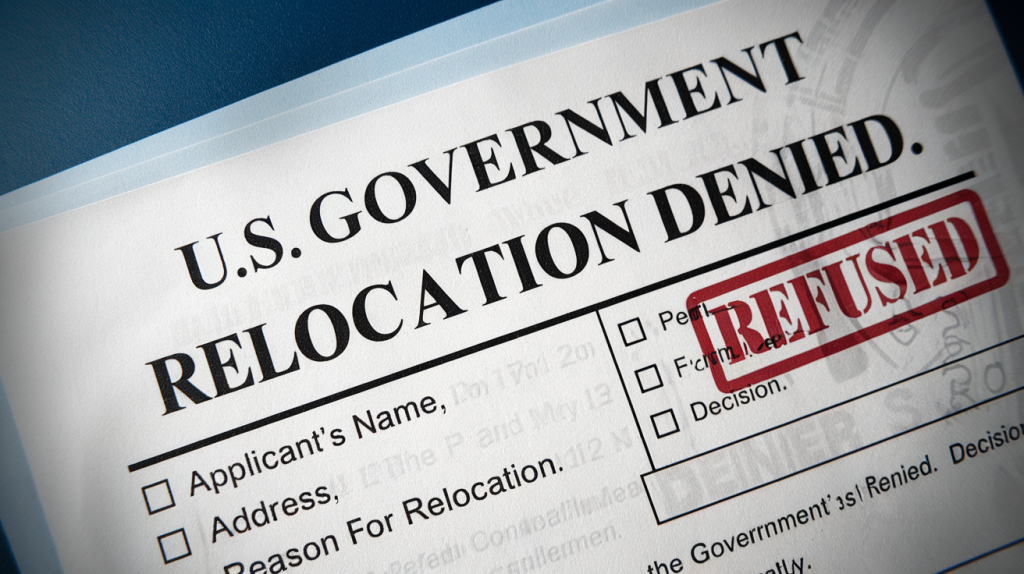Moving with your kids after divorce isn’t always straightforward.
The court looks at many factors before giving you the green light. Your judge wants what’s best for your children, and sometimes that means saying no to your plans.
Let’s look at the key reasons why judges deny relocation requests. This blog will help you understand what matters most in these decisions.
You’ll learn about common pitfalls that could affect your case and how courts think about these requests.
Going through a relocation request can feel overwhelming. But knowing why judges say no can help you prepare better.
Legal Framework for Relocation for Every Individual
Relocation can be a complicated issue when it comes to child custody.
Whether a parent wants to move to a different city, state, or even country, the decision can significantly affect the child’s relationship with both parents.
Any change in the child’s primary residence, whether it be out of state or a considerable distance within the same state, is referred to as a relocation.
To get approval for relocation, the custodial parent typically must formally notify the other parent and, if contested, prove that the move is in the child’s best interest.
List of Reasons a Judge May Deny Relocation Request

Judges weigh several factors when deciding whether to grant or deny a relocation request, with the child’s best interests as the primary concern.
1. Not Following Proper Procedure
Strict legal procedures bind relocation requests. Each state has its own set of requirements, such as filing specific petitions or notifying the other parent within a certain timeframe.
A failure to follow these procedures can result in a judge denying the request outright.
However, ensuring all required steps are followed properly is essential for a successful relocation request.
2. Negative Impact on The Child’s Life
The primary concern for a judge when considering a relocation request is how it will affect the child.
A move could disrupt the child’s stability, particularly if it involves a change in schools, loss of community ties, or moving far from the other parent.
A judge will thoroughly assess whether the move is in the child’s best interests or if it risks creating an unstable environment for them.
3. Insufficient Justification
For a relocation request to be approved, the parent must present compelling reasons for moving.
Valid justifications include securing a better job, offering a safer or more fulfilling environment for the child, or providing the child with improved educational opportunities.
If the parent’s reasons are deemed weak or unconvincing, the judge may deny the request.
4. Recent Divorce or Separation
If the request is made shortly after a divorce or separation, the judge may question the motivations behind it.
Moving immediately after these significant life changes can signal a lack of stability or consistency in the child’s life.
The judge might see this as a tactic to escape co-parenting responsibilities or avoid previous agreements made during the case.
5. Selfish Reasoning
Relocation decisions must prioritize the child’s well-being. The judge may not approve if the move benefits the parent more than the child.
A request to relocate based on the parent’s personal desires or convenience, without clear benefits for the child, is likely to be denied.
The court will carefully weigh whether the move serves the child’s best interests.
6. Uncooperative Co-Parenting
A parent’s history of poor co-parenting, such as denying visitation or failing to communicate, can work against them when seeking relocation.
Judges are concerned about a parent’s willingness to cooperate in the future, particularly when the other parent will be far away.
If the parent requesting the move has a history of being uncooperative, it could harm their chances of approval.
7. Desire to Punish the Other Parent
Moving to limit the other parent’s access to the child or as a form of retaliation is not considered a valid reason for relocation.
Judges will not support moves made out of spite or with the intent to hurt the other parent.
The moving parent must show that the other parent will still have meaningful and consistent visitation or involvement with the child, even after the move.
8. Disrupting the Relationship with The Other Parent
One of the most important factors in relocation cases is the impact the move will have on the relationship between the child and the non-relocating parent.
If the move would create significant obstacles to maintaining a close and healthy bond, the judge may deny the request.
The judge will assess the child’s emotional needs and their ability to continue a strong relationship with both parents.
9. Lack of a Comprehensive Parenting Plan
Relocation cases require a detailed and comprehensive parenting plan.
This plan should address key concerns, such as the logistics of visitation, how the child will be transported, and how communication between the child and the non-relocating parent will be maintained.
If the requesting parent fails to present a thorough plan that addresses these issues, the judge may reject the relocation request.
10. History of Noncompliance
A history of noncompliance with previous court orders can severely hurt a parent’s relocation request.
This includes not paying child support, violating visitation agreements, or ignoring other court mandates.
A judge may view the relocation request as a tactic to avoid fulfilling obligations or responsibilities, leading to a denial.
11. Child’s Preferences
Older children may have opinions on the proposed move, and the court may consider their preferences, especially if they are mature enough to express their feelings.
While the child’s preferences are not the sole deciding factor, a child’s strong objections to the move or emotional distress about the idea can influence the judge’s decision.
The judge will weigh the child’s emotional well-being and ability to adapt to the change.
12. Negative Impact on The Child’s Quality of Life
If the relocation negatively impacts the child’s quality of life,
such as a downgrade in living conditions, diminished access to extracurricular activities, or a less safe environment—the judge is likely to deny the request.
The judge’s priority is always the child’s physical, emotional, and educational well-being. It may be rejected if the move doesn’t improve or maintain these aspects of the child’s life.
13. Lack of Good Faith Reason
Judges scrutinize the motivations behind a relocation request.
If there are suspicions that the move is being requested for petty reasons, such as to avoid obligations or to harm the other parent, the judge will likely reject the request.
The parent must show that the reasons behind the move are sincere and focused on improving the child’s life, not on personal gain.
Major Impact of Relocation on Child Custody

The impact of a relocation on child custody depends on the situation’s specifics.
Suppose the relocation is substantial, requiring significant travel to see the non-relocating parent. In that case, it can affect visitation rights, the child’s schooling, and the ability to maintain regular contact.
Even if the custody agreement allows for flexibility, relocation can change how those arrangements are carried out.
Some parents may find it hard to adjust to new schedules, especially if the move is far from the other parent’s home.
Courts must assess whether the move is in the child’s best interest and whether the relocation would harm the child’s relationship with the non-relocating parent.
Certain Scenarios When a Judge Approves Relocation Request

Judges may approve relocation requests for various reasons, prioritizing the child’s best interests, such as:
- Improved Circumstances: A parent’s relocation may be approved if it improves the child’s life. This can include moving for a higher-paying job, which enhances financial stability, or moving closer to extended family members, which provides a stronger support system.
- Medical Care: Relocation may be approved if it allows a child to receive necessary medical care for an illness.
- Protection from Harm: A judge may approve relocation to protect the parent and child from the other parent.
- Agreement with The Other Parent: If both parents agree to the relocation and it is in the child’s best interests, the judge will likely approve the request.
- Better Opportunities: Valid and substantial reasons for relocation, such as better employment opportunities, enhanced quality of life, or improved educational prospects for the child, can lead to approval.
- Compliance with Court Orders: Judges consider whether both parents have complied with existing custody orders. A history of compliance strengthens the relocation case.
- Continued Relationship with Non-Relocating Parent: If the relocation allows the non-relocating parent to maintain their relationship with the child through a realistic visitation schedule, it increases the likelihood of approval.
Conclusion
Relocation requests are never simple because there are many factors that a judge will consider before making a decision.
It’s not just about the parent’s wishes—it’s about what’s best for the child.
When considering a relocation, it’s crucial to show that the move will benefit the child, offer a stable environment, and provide a clear plan for maintaining relationships with both parents.
However, understanding these factors can help a parent prepare for the possibility of their request being denied and help them handle family law’s complexities.
Frequently Asked Questions
Are Relocation Cases Hard to Win?
Yes, relocation cases can be challenging, as courts prioritize the child’s best interests and carefully consider the potential impact on their relationship with both parents.
How Do You Get Your Ex to Agree to Relocate?
Clearly explain the benefits of the move, offer a fair parenting plan, and address their concerns to help them see the relocation’s positive impact on the child.
How Do You Win a Relocation Case?
Provide solid reasons for the move, show a detailed parenting plan, demonstrate financial stability, and prove the relocation benefits the child’s well-being without harming their relationship with the other parent.








